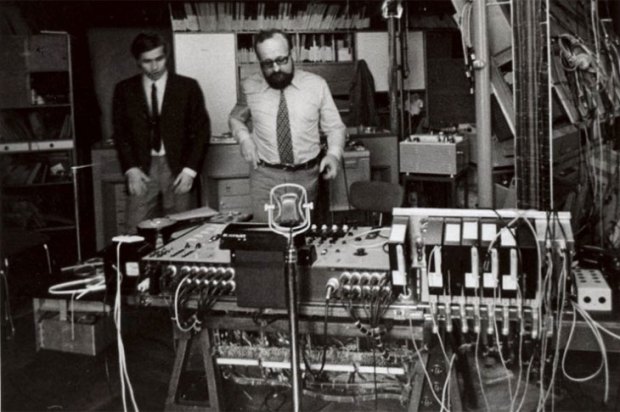Slow radio is popping up everywhere at the moment — programmes that have no outward form but just meander through the schedule, and often, but not always, are played out live in real time. In spite of their spontaneous feel and free flow these programmes have usually been carefully orchestrated, and that’s part of slow radio’s appeal: crafted to sound like life itself, impressionistic, en plein air, long-running. It’s not to everyone’s taste — too slow, too redolent of nostalgia for a mystical past where there was once time and space to think. Who wants to follow Horatio Clare’s every footfall as he tramps for ten miles along Offa’s Dyke (as happened on Radio 3 in the spring)? What possible benefit can be had from listening to others experiencing that precious peace we feel ourselves to be without?
In fact, there’s nothing particularly new about slow radio apart from the recognition that such a genre exists. Words and Music, Radio 3’s seamless sequence of carefully blended tunes and readings, has been on air every Sunday evening for at least ten years. At first there were grumbles (some not so quiet) from those who could not bear the tension of not being able to identify the music, let alone the readings, and suspected it was just an economy drive, dispensing with the business of programme-making. Now, though, it has become a much-loved part of the schedule, precisely because it allows for serendipitous connection through form and structure. And perhaps that’s the key to what makes slow radio different from those overnight sequences of music that have long been essential to the radio schedules. It’s all about intelligent design.
Music, Life and Dementia (produced by David Papp) through the night on Saturday was a masterclass in how to make the most of being slow, of having time to make sense of the present moment. Its sequence of interviews and musical excerpts explored the difficult subject of dementia from many points of view. Many of the interviewees were sufferers and for them communicating in words was difficult. The music echoed what they were trying to say, adding meaning, enhancing the flow.
After Tanya told us how she first knew things were not right, letters tumbling about on the page, making no sense, ‘a strange ballet of words’, we next heard the Gavotte and Bourrée from Bach’s French SuiteNo. 5, the notes bouncing off the radio just like those dancing words. But more importantly the music reflected the tone of what Tanya was saying. She was remarkably frank and positive about her condition, in spite of having been diagnosed aged just 45. You have to go through a bereavement process, she explained, but she insisted there was still a big part of her that finds life ‘great’: cue Ravel’s String Quartet, the musical texture and the upbeat feel responding to what she had just said.
Another advantage of slow radio is that you can dip in and out as you feel, picking up the thread of meaning, which was sustained throughout, holding it all together. At six hours, it’s unlikely anyone would listen to Music, Life and Dementia all the way through in one stretch, although it would make a wonderful companion on any long journey. It was part of Radio 3’s weekend at the Wellcome Collection, bringing together musicians, scientists, researchers and those with stories to tell about the connections between music and memory. In Beyond Memory: Music in the Moment earlier in the day, Sarah Walker talked to experts who are trying to understand why musical memory is the last to go, patients with severe memory loss able to sing whole songs and hymns with every word in its right place. What does this tell us about the effect of music on the brain? Why can patients with amnesia, who literally live in the moment, with no memory of past events or knowledge, including the former Radio 3 producer Clive Wearing, still conduct, play the piano and read music? Researchers believe it has something to do with the memory of themusic being distinct from the feeling of remembering.
Meanwhile, the pianist Anna Tilbrook who works with the Lost Chord organisation, playing concerts for those with dementia and other neurological problems in care homes and hospitals, has direct experience of music’s impact. Henry Mancini’s ‘Moon River’ affects most people, she says, bringing life to one patient who had been in the care home for six months without speaking to anyone. On hearing the tune, he suddenly began mouthing all the words. He was not audible but every word was exactly on beat, in rhythm; ‘something had happened’. Playing live is the key, said Tilbrook, so that sometimes at the beginning the patient might not have been able to speak their name but by the end has opened up to tell their life story. ‘Music is a really powerful medium of connection,’ Walker concluded, ‘and is retained in all of us right up to the very end of life.’
Got something to add? Join the discussion and comment below.
Get 10 issues for just $10
Subscribe to The Spectator Australia today for the next 10 magazine issues, plus full online access, for just $10.
You might disagree with half of it, but you’ll enjoy reading all of it. Try your first month for free, then just $2 a week for the remainder of your first year.














Comments
Don't miss out
Join the conversation with other Spectator Australia readers. Subscribe to leave a comment.
SUBSCRIBEAlready a subscriber? Log in